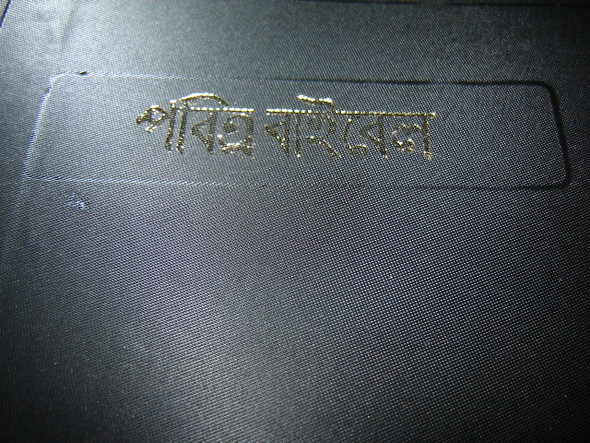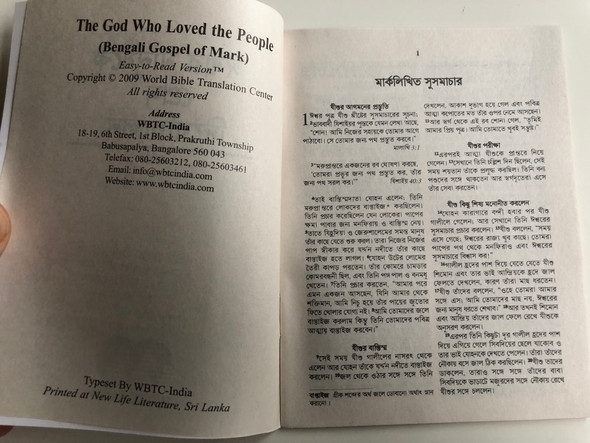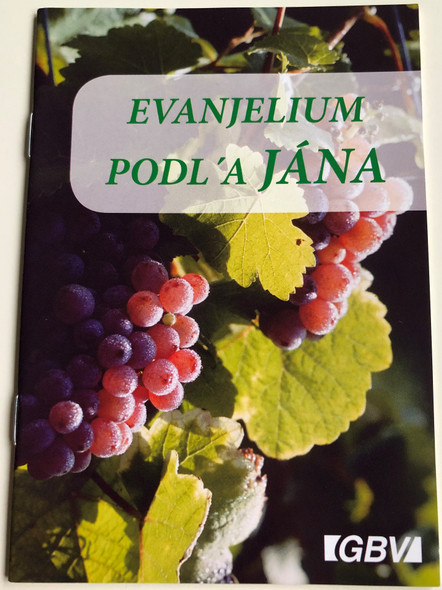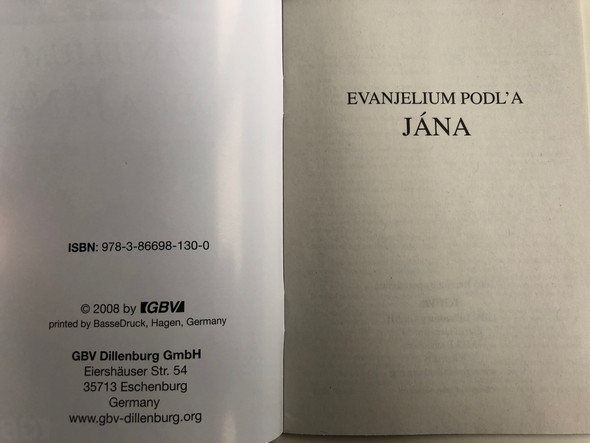Description
The Gospel According to John (Bengali) – Evangelism Booklet
Product Details | পণ্য বিবরণী
- Title | শিরোনাম: The Gospel According to John (Bengali)
- Format | ফরম্যাট: Paperback (1998)
- Pages | পৃষ্ঠাসংখ্যা: 64
- Publisher | প্রকাশক: India Bible Literature
- Language | ভাষা: Bengali (বাংলা)
Description | বিবরণ
The Gospel According to John (Bengali) presents the life, ministry, and teachings of Jesus Christ in clear and accessible Bengali. This evangelism booklet is designed to share the message of salvation, offering a deep understanding of Christ’s love, miracles, and the path to eternal life.
This 64-page compact edition is an excellent resource for personal study, outreach, and missionary work. It is perfect for Bengali-speaking readers seeking the truth of the Gospel and provides an easy-to-read and faithful translation of John's Gospel.
যোহনের সুসমাচার (বাংলা ভাষায়) পুস্তিকাটি যীশু খ্রিস্টের জীবন, শিক্ষা ও খ্রিস্টান বিশ্বাসের মূল বার্তা সহজ ভাষায় উপস্থাপন করে।
এটি বৈপ্লবিক সংবাদ প্রচারের জন্য একটি অসাধারণ পুস্তিকা, যা যীশুর প্রেম, অলৌকিক ঘটনা ও অনন্ত জীবনের পথ সম্পর্কে সুস্পষ্ট ধারণা প্রদান করে।
এই ৬৪ পৃষ্ঠার সংক্ষিপ্ত সংস্করণটি ব্যক্তিগত অধ্যয়ন, প্রচার ও মিশনারি কাজে ব্যবহারের জন্য উপযোগী। বাংলা ভাষাভাষী পাঠকদের জন্য এটি একটি সহজবোধ্য ও নির্ভরযোগ্য অনুবাদ।
Key Features | মূল বৈশিষ্ট্যসমূহ
✔ Authentic Bengali Translation | বিশুদ্ধ বাংলা অনুবাদ – Faithful to the original Gospel of John. | যোহনের সুসমাচারের নির্ভুল ও বিশ্বাসযোগ্য অনুবাদ।
✔ Perfect for Evangelism | সুসমাচার প্রচারের জন্য উপযোগী – Designed for spreading the message of Christ. | যীশুর সুসমাচার প্রচারের জন্য আদর্শ।
✔ Easy-to-Read Format | সহজপাঠ্য বিন্যাস – Clear language, making it suitable for all readers. | সহজ ভাষা, যা সকল পাঠকের জন্য উপযুক্ত।
✔ Compact & Portable | বহনযোগ্য ও সুবিধাজনক – Ideal for distribution and sharing. | সহজে বহনযোগ্য ও বিতরণের জন্য আদর্শ।
✔ Christ-Centered Message | খ্রিস্ট-কেন্দ্রিক বার্তা – Focuses on Jesus’ divinity, love, and salvation. | যীশুর দৈবত্ব, প্রেম ও পরিত্রাণের ওপর বিশেষ গুরুত্ব দেয়।
Interesting Facts | তথ্য যা জানার মতো
Why the Gospel of John? | কেন যোহনের সুসমাচার? – The Gospel of John highlights Jesus as the Son of God, revealing His love and divine purpose for humanity.
A Powerful Evangelism Tool | প্রচারের শক্তিশালী মাধ্যম – Perfect for sharing with seekers, new believers, and those interested in Christianity.
Bengali Language Outreach | বাংলা ভাষাভাষীদের জন্য প্রচার কার্যক্রম – Helps spread the Gospel among millions of Bengali speakers worldwide.
কেন যোহনের সুসমাচার? – যোহনের সুসমাচার যীশুকে ঈশ্বরের পুত্র হিসেবে তুলে ধরে, এবং মানবজাতির প্রতি তাঁর প্রেম ও ঈশ্বরীয় পরিকল্পনা প্রকাশ করে।
সুসমাচার প্রচারের শক্তিশালী মাধ্যম – নতুন বিশ্বাসী ও আগ্রহী পাঠকদের জন্য আদর্শ।
বাংলা ভাষায় প্রচারের একটি গুরুত্বপূর্ণ উপায় – বিশ্বব্যাপী লক্ষ লক্ষ বাংলা ভাষাভাষীদের কাছে সুসমাচার পৌঁছে দিতে সহায়ক।
Publisher | প্রকাশক
India Bible Literature – A dedicated publisher committed to spreading the Gospel through Christian literature in Indian languages.
ইন্ডিয়া বাইবেল লিটারেচার – বিভিন্ন ভারতীয় ভাষায় খ্রিস্টীয় সাহিত্য প্রকাশের মাধ্যমে সুসমাচার প্রচারের জন্য প্রতিশ্রুতিবদ্ধ।
Reader Reviews | পাঠকদের মতামত
"A must-read for Bengali-speaking believers and seekers."
"An excellent evangelism tool for sharing the Gospel in Bengali."
"Easy to read, powerful message!"
"বাংলাভাষী বিশ্বাসী ও অনুসন্ধানকারীদের জন্য অবশ্যই পড়ার মতো একটি বই।"
"বাংলা ভাষায় সুসমাচার প্রচারের একটি চমৎকার মাধ্যম।"
"সহজ ভাষা ও শক্তিশালী বার্তা!"
Have you read this booklet? | আপনি কি এটি পড়েছেন? Share your thoughts with others! | আপনার মতামত শেয়ার করুন!
Hashtags | হ্যাশট্যাগসমূহ
#GospelOfJohn #BengaliBible #Evangelism #ChristianLiterature #JesusChrist #IndiaBibleLiterature























 1.JPG)
 6.JPG)
 8.JPG)
 11.JPG)

















